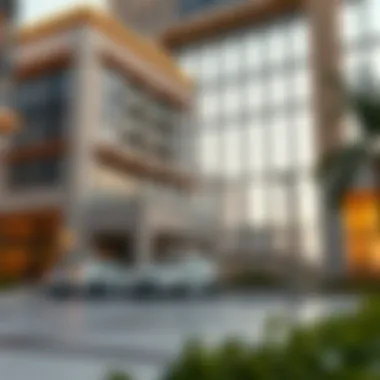Dynamic Insights into Dubai's Real Estate Market


Intro
Dubai's real estate market stands at the forefront of global property discussions, marked by its unique blend of luxury, innovation, and investment potential. Whipping through this dynamic landscape, one encounters an array of influences that dictate market behavior and investment choices. It's not merely about bricks and mortar; it's a thriving ecosystem influenced by economic trends, government policies, and technology advancements.
Investors, homebuyers, and industry professionals alike find themselves navigating a complex web of opportunities and challenges. As the market continues to evolve, understanding these dynamics is not just advisable; it’s essential for anyone looking to make a mark in Dubai's property sector.
This article seeks to uncover the layers of Dubai's real estate phenomena. We will dissect current market trends, spotlight emerging neighborhoods, and delve into strategic investment approaches. By the end of this exploration, stakeholders will gain sharper insights into the nuances that define this vibrant market.
Distinctive features of Dubai's property landscape influence everything from buying habits to rental rates. Thus, whether one is contemplating a purchase, seeking a rental opportunity, or considering long-term investments, becoming well-versed in local dynamics is paramount.
Understanding Dynamic Properties
Understanding the concept of dynamic properties in real estate is crucial, especially in a rapidly changing market like Dubai's. Dynamic properties refer to the attributes of real estate that are adaptable and evolving, influenced by a variety of factors such as economic conditions, regulatory changes, and technological advancements. By grasping these dynamic characteristics, investors, homebuyers, and other stakeholders can make informed decisions that align with current market trends.
The benefits of comprehending dynamic properties are manifold. For investors, it means being on the front foot in identifying lucrative opportunities in the market. Homebuyers can better navigate their purchasing decisions knowing how property values can fluctuate. Furthermore, for architects and designers, understanding dynamic properties fosters innovation in building design, meeting the ever-changing demands of residents and investors alike.
Dynamic properties also necessitate continual education about the real estate sector. The market can shift with surprising speed, requiring participants to remain agile and informed. By focusing on these dynamic features, stakeholders can anticipate challenges and mitigate risks proactively. This approach is notably relevant in a global city like Dubai, where competitive and economic factors frequently interplay to reshape the landscape of real estate.
Definition of Dynamic Properties
Dynamic properties can be defined as those characteristics of real estate that are responsive to external influences, which may include economic trends, shifts in demographic patterns, or advancements in technology. Unlike static properties, which remain relatively unchanging, dynamic properties can adjust in value, demand, and appearance based on various factors.
A classic example in Dubai could be the rise of luxury apartment complexes that respond to increasing demand from international buyers seeking investment opportunities. As the market fluctuates, the attributes that define an appealing property—such as amenities, location desirability, and sustainability—also transform to match buyer preferences and economic viability.
Significance in Real Estate
The significance of dynamic properties in real estate cannot be overstated. They play a pivotal role in shaping investment strategies and market behaviors. Here’s why they matter:
- Market Responsiveness: Properties that adapt to market demands tend to retain or increase their value. For instance, developers incorporating smart technology and eco-friendly designs are often favored by buyers and tend to see quicker sales.
- Investment Stability: Investors who understand the dynamic aspects of properties can make more stable, long-term investments. For example, a property situated in an up-and-coming neighborhood may fluctuate in value based on urban development projects that are underway.
- Cultural Relevance: As societal trends shift, so do preferences in real estate. For instance, an increasing focus on community living can lead to a higher demand for co-living spaces in urban areas, emphasizing the need for developers to pay close attention to these shifts.
"Real estate isn’t just about bricks and mortar; it’s about capturing the pulse of economic growth, societal change, and technological innovation."
For further insights, you might explore resources like Wikipedia, and Britannica, which delve into various aspects of real estate and market dynamics.
Economic Factors Shaping Real Estate
Economic factors play a crucial role in determining the health and direction of Dubai's real estate market. These elements define not just the current status of property values but also shape future investments, making it vital for stakeholders to grasp their relevance. Economic growth, inflation trends, and currency fluctuations are intertwined threads that weave a larger narrative about market behavior. Understanding how these dynamics influence decisions can empower investors, homebuyers, and agents to navigate this vibrant marketplace with greater clarity.
Impact of Economic Growth
In the realm of real estate, the timing of economic growth can shift the tides substantially. When Dubai experiences robust economic growth, one often notices a direct correlation with rising property prices. This phenomenon can be attributed to increased demand driven by higher disposable incomes and burgeoning job opportunities.
For instance, during periods of global economic stability, heightened interest in Dubai as a hub for business and tourism propels the real estate market forward. Companies locate headquarters here, and expatriates flock in looking for housing, increasing competition for available properties. A prime example of this trend was observed post-Expo 2020, when infrastructure investments and increased tourist footfall significantly boosted local demand for real estate.
This surge can lead to a cycle where increased prices encourage further development and investment.
"Economic growth isn’t merely a number; it’s the pulse of a thriving region's property market."
Inflation Trends and Property Values
Inflation, while often viewed with trepidation, can also create unique opportunities within the real estate sector. As prices escalate across the board, the value of properties tends to rise as well. This makes real estate a more attractive investment, serving as a hedge against inflation. When inflation creeps up, many investors look toward tangible assets, such as property, to secure their capital.
In Dubai, high inflation can unleash rapid rent increases, affecting both residential and commercial sectors. Renters may find themselves squeezed, while landlords enjoy enhanced yields. However, if inflation exceeds wage growth, the narrative can shift - potential buyers and renters may be unable to keep pace with rising costs, impacting overall demand.
It’s important to keep a finger on the pulse of inflation trends to anticipate changes in market behavior. Understanding when to buy or sell could be the difference between making a substantial profit or enduring a significant loss.
Currency Fluctuations and Foreign Investment
Dubai's real estate market has always attracted significant foreign interest, and currency fluctuations can substantially influence this dynamic. When the value of the UAE Dirham strengthens against other currencies, foreign investors find themselves navigating higher costs for property purchases. Conversely, a weaker Dirham can make investments in Dubai notoriously attractive, drawing in a flood of international buyers eager to cash in on perceived bargains.
For instance, changes in global economic conditions often lead to shifts in currency values. Should the dollar weaken against the Dirham, investors from countries with stronger currencies may rush to buy up properties, stimulating the market.
Also, regional instability or shifts in geopolitics can impact these dynamics. Thus, savvy investors must stay tuned to exchange rates, recognizing their impact on potential returns.
For further understanding of how economic indicators shape real estate markets globally, you can visit Wikipedia or explore data through platforms like Trading Economics.


Moreover, engaging regularly with forums such as Reddit can provide anecdotal insights and current sentiments from those directly involved with the market.
Regulatory Framework and Its Effects
Understanding the regulatory framework surrounding Dubai's real estate market is crucial for several reasons. For one, it establishes the ground rules for ownership, transactions, and overall market behavior. This framework is not just a set of guidelines; it shapes the environment in which investors and buyers operate, offering both opportunities and challenges.
Understanding Ownership Laws
Ownership laws in Dubai are unique and distinct from those in many other countries. The concept of freehold ownership was introduced in 2002, permitting foreign nationals the right to buy property in designated areas. This move was a game-changer, transforming Dubai into a global real estate hub. However, it's vital for potential investors to understand that while certain areas are open to foreign ownership, there are still significant restrictions based on location and property type.
- Freehold Properties: These properties allow complete ownership of the property and the land it sits on. Examples include areas like Dubai Marina and Downtown Dubai.
- Leasehold Properties: Typically extending for a period up to 99 years, these properties allow non-UAE nationals to lease a property rather than own it outright. Locations like Jumeirah Beach Residence fall under this category.
Being competent in these distinctions can make or break an investment decision. Clarity around ownership rights serves as the foundation upon which investments rest.
Exploring Recent Policy Changes
In recent years, Dubai has witnessed a slew of policy changes aimed at enhancing market stability and attractiveness to foreign investors. In 2021, the introduction of the Residency by Investment program helped boost investor confidence. This policy allows property investors to obtain a residency permit in exchange for purchasing a property of a certain value, promoting a sense of security and investment longevity.
Additionally, the government has implemented a new strategy for residential and commercial space development to tackle supply and demand disparities. They have focused on regulations that ensure sustainable building practices while addressing housing affordability. Understanding these changes can provide insights into current trends and assist investors in aligning their strategies with governmental objectives.
Taxation Policies and Real Estate Investments
When considering real estate in Dubai, taxation policies play a significant role in determining the investment landscape. Unlike many countries, the absence of property tax is a significant attraction. However, investors must be aware of related costs such as the 4% transfer fee that applies on property purchases, and possible service charges tied to property management.
Moreover, the government introduced a Value Added Tax (VAT) of 5% on certain goods and services, which includes some real estate transactions. Knowing these nuances can enable investors to calculate their costs effectively and ensure better financial planning.
To summarize:
- No Property Tax: A major advantage for long-term investors.
- 4% Transfer Fee: Mandatory for property transactions.
- Value Added Tax: Applicable on some transactions, which could affect overall investment returns.
Understanding these cost structures is crucial for adeptly navigating the market landscape.
"Navigating the regulations in Dubai’s real estate market is like piecing together a complex puzzle—getting the pieces right leads to a clearer picture of opportunities ahead."
The regulatory framework significantly impacts how real estate develops and operates within Dubai, making it essential for investors to remain informed and adaptable.
Technological Advancements in Real Estate
The integration of technology within the real estate sector is not just a trend; it’s a profound transformation. In a competitive environment like Dubai’s real estate market, the role of technological advancements emerges as a vital element. They are reshaping how properties are bought, sold, and managed, providing a range of benefits from enhanced efficiency to better data accessibility. The advancing tech landscape works not just for brokers and developers, but also presents fresh avenues for investors and homebuyers alike. The growing impact of these innovations demands attention as they shape the dynamics of market transactions and client relationships.
The Role of PropTech
PropTech, or Property Technology, is redefining the way we perceive real estate operations. It encapsulates various tech solutions that streamline real estate processes, such as property management software, platforms for virtual tours, and artificial intelligence tools for predicting market trends. One prominent example is the utilization of online platforms like Property Finder and Bayut, which harness algorithms to match buyers with properties tailored to their criteria. This creates a more user-centered experience, ensuring both buyers and sellers maximize their engagement.
- Efficiency Gains: Transaction times have shrunk dramatically with the advent of online listings and streamlined processes.
- Accessibility of Information: Buyers now can view numerous listings from the comfort of their homes, evaluating options based on comprehensive data.
- Market Transparency: Increased visibility into property values fosters trust among consumers.
PropTech's continual evolution is a key factor in driving forward any dynamic market. It empowers professionals by equipping them with tools that enhance productivity, ultimately translating to better customer service.
Smart Homes and Their Influence
The rise of smart homes is rapidly changing buyer expectations within the Dubai real estate market. Smart homes are equipped with integrated technology that automates various functions—anything from lighting and heating to security systems—all controllable through smartphones and voice-command devices. The allure of smart homes goes beyond mere convenience; they offer potential cost savings and improved energy efficiency, appealing directly to the eco-conscious consumer.
- Energy Management: Smart meters allow homeowners to monitor energy consumption in real-time, leading to savings on monthly bills.
- Increased Security: Advanced security features, such as remote cameras and smart locks, provide residents peace of mind.
- Attracting Specific Demographics: Younger generations, especially millennials and Gen Z, prioritize tech-savvy features when looking to purchase or rent property.
The cumulative effect of these features makes smart homes a compelling investment, further fueling demand in the market.
Data Analytics and Market Insights
In today’s data-driven world, the real estate sector relies heavily on analytics to make informed decisions. By leveraging big data, real estate professionals in Dubai can glean critical insights concerning market trends, consumer behavior, and investment risks. Companies utilize sophisticated data analytics tools to process vast amounts of information, identifying patterns that inform strategic choices.
- Predictive Modeling: Analysts can predict future market movements, enabling investors to act with foresight rather than reactively.
- Client Preferences: Understanding shifts in buyer preferences encourages developers to design properties that align with demand, thus reducing vacancy rates.
- Valuation Accuracy: Enhanced data leads to precise property evaluations, directly impacting pricing strategies and investment decisions.
Utilizing advanced analytics not only enhances operational strategies but also provides a competitive edge in a bustling market such as Dubai.
Sociocultural Dynamics and Real Estate Demand


The pulse of a city lives within its people—their cultures, preferences, and lifestyles. This section sheds light on the significance of sociocultural dynamics within Dubai's real estate market, detailing how they shape demand. Understanding these social constructs is crucial for investors, homebuyers, and real estate professionals, as they can directly influence purchasing decisions and investment opportunities.
Demographic Shifts and Effects
Demographic changes in Dubai, reflective of broader global trends, play a pivotal role in shaping the property market. The city attracts a melting pot of cultures, primarily due to its robust economy and outstanding quality of life. A notable uptick in the expatriate population affects housing demand significantly. As younger professionals flock to the emirate seeking job opportunities, there's a growing need for properties that cater to their tastes—be it modern flats in urban settings or family-sized homes in suburban sprawls.
A key point here is the persistent influx of millennials and Generation Z into the workforce, who tend to favor rental properties over buying. This shift creates a substantial demand for affordable yet stylish apartments, often leading property managers to innovate designs that resonate with a fast-paced lifestyle. Equally, as families expand, the move toward larger properties becomes evident, meaning the market must be ready to pivot amid shifting needs.
Cultural Influences on Property Preferences
Cultural aspects significantly dictate property preferences in Dubai. For instance, the local population values traditions while blending modern living—leading to a desire for homes with family-oriented features such as multiple bedrooms, cultural spaces, and communal gathering areas. Moreover, the influx of expatriates introduces a wide variety of preferences that further diversifies the market.
It's interesting to note that many expatriates seek properties that offer a sense of community. Developments that incorporate parks, recreational spaces, and proximity to cultural hubs see higher demand. Real estate investors would do well to consider these cultural nuances; offering properties that resonate with the local and expatriate markets can yield impressive returns.
Lifestyle Changes Driving Market Trends
In the wake of rapid urbanization, lifestyle changes have become a significant driving force in Dubai's real estate landscape. The pandemic accelerated shifts towards remote working, prompting many to reconsider their living arrangements. There’s been a marked preference for properties with spaces conducive to home offices, larger outdoor areas, and proximity to essential services. Such dynamics have led to a surge in demand for suburban homes and villas away from the bustling center of the city.
Furthermore, there's an increasing consciousness around sustainable living. Modern buyers often look for environmentally sustainable properties integrated with smart technology, further diversifying the investment landscape.
Enhanced amenities, accessibility, and community features greatly influence buyers' decisions in Dubai’s competitive market.
Risk Factors in Dynamic Markets
In the ever-evolving landscape of Dubai’s real estate market, understanding risk factors is crucial. Investors and stakeholders must navigate through potential pitfalls that can impact their investments. Identifying these risks can make the difference between a lucrative investment and a financial disaster. The complex interplay of market conditions, regulations, and societal changes necessitates a comprehensive approach to risk assessment. This section will unpack critical risk elements and their implications for investors and stakeholders alike.
Market Volatility and Its Implications
Market volatility refers to the fluctuations in property prices and demand driven by a range of factors including economic conditions, investor sentiment, and changes in legislation. In Dubai, volatility can stem from rapid economic growth paired with sudden market downturns, which can leave investors in a lurch. For instance, during the global economic downturn caused by the pandemic, property prices in Dubai witnessed significant drops. However, subsequent recovery phases showcased price rebounds, highlighting the unpredictable nature of the market.
Investors should keep an eye on both macro and microeconomic indicators such as:
- Changes in the oil market, given that the UAE's economy is heavily reliant on oil exports.
- The influence of foreign investment patterns, which can lead to sharp price changes.
- Real estate supply and demand dynamics, often influenced by global investor migration trends.
In summary, the ability to adapt to market volatility requires a vigilant mindset. Preparing for potential downturns, through strategies like portfolio diversification, can mitigate adverse impacts.
Legal Risks for Investors
Navigating the legal landscape of real estate investment in Dubai is fraught with potential challenges. Different laws governing property ownership, transaction processes, and tenant rights can create significant hurdles. For example, foreign investors may encounter restrictions on property ownership, which can vary depending on whether the investments are made in freehold or leasehold areas.
Crucial legal considerations include:
- Ownership Laws: Familiarity with local property laws is essential. Buyers should ensure that their ownership documents are in order and that they fully understand their rights, especially regarding lease agreements.
- Dispute Resolution: Legal disputes can arise, whether with a seller, tenant, or the government. Understanding the mechanisms for resolution, such as arbitration or local court systems, is vital.
- Regulatory Changes: Government policies can shift, affecting tax obligations or ownership rights overnight. Keeping abreast of these changes can safeguard investments against unexpected penalties.
Due diligence is key. Engaging local legal experts can provide insights and safeguard against legal blunders that could prove costly.
Environmental Considerations and Sustainability
In recent years, there has been a global shift towards sustainability, impacting real estate significantly. Dubai, facing challenges such as land scarcity and increasing pressures on infrastructure, must prioritize sustainable development. Environmental risks can translate directly into financial risks. From natural disasters to regulatory penalties for non-compliance with environmental standards, investors must be proactive.
Several aspects to consider include:
- Climate Change Impacts: Properties in flood-prone regions or those vulnerable to extreme temperatures face increased maintenance costs and insurance premiums.
- Sustainability Regulations: Expectations for environmentally responsible buildings can lead to extra expenses. However, they also provide opportunities for premium pricing on eco-friendly properties.
- Community and Market Preferences: Today’s buyers and renters are often inclined towards sustainable living options, which means properties lacking in this respect might struggle to attract tenants.
Investors can benefit from integrating sustainability into their strategies, aligning with global trends, and enhancing appeal to a growing demographic of environmentally-conscious consumers.
For further reading and resources, you may find the following useful:
- Wikipedia on Dubai Real Estate
- Bureau of International Information Programs
- Environmental Protection Agency
- Dubai Land Department
Investment Strategies in a Dynamic Environment
In the ever-evolving landscape of Dubai's real estate market, investors need to be equipped with solid strategies to navigate complexities and volatility. The dynamic environment demands agility in decision-making, as the goal is to optimize returns while managing risks effectively. Essentially, strategic investment in properties is not merely about acquiring real estate; it requires a blend of analysis, foresight, and an understanding of both market nuances and global dynamics.
Diversification and Risk Management


Diversification serves as a cornerstone of risk management in real estate investments. Instead of placing all eggs in one basket, savvy investors spread their investments across various property types and locations. For instance, combining residential units in Downtown Dubai with commercial spaces in Jebel Ali helps mitigate risks posed by market fluctuations specific to one sector. This approach is particularly important in a dynamic market like Dubai's, where demand can shift due to economic changes or even geopolitical events.
Moreover, diversification isn’t just about properties; it can also extend to the investor's portfolio. By including alternative investment vehicles like REITs or even overseas properties, investors can offset risks associated with local market downturns.
Long-Term vs. Short-Term Investments
When considering investments in Dubai's real estate, the debate between long-term and short-term strategies often arises. Short-term investments can yield quick profits, but they come with increased risks due to market volatility and unforeseen expenses. For example, flipping properties in neighborhoods that are undergoing rapid gentrification may offer rewards but also expose investors to the risks tied to market timing.
On the other hand, long-term investments, such as residential rental properties, provide consistent income streams and are generally less susceptible to short-term fluctuations. Investors may discover that holding on to a property for a decade can increase its value significantly, especially in a city like Dubai, where infrastructure and development projects continue to thrive.
Leveraging Market Analysis for Decision-Making
In order to make informed decisions, a comprehensive understanding of market dynamics is essential. Market analysis encompasses studying trends, property values, demand-supply ratios, and competitor activities. Tools like Zillow or local real estate platforms provide insights that can help investors gauge the best opportunities.
A stark example of this is during the pandemic, when many investors initially hesitated, but those who conducted thorough market research found pockets of opportunity, as prices began to stabilize and then bounce back. By closely monitoring market shifts and adopting analytical tools, investors can make data-driven decisions and seize the right moment for investment.
Remember, in the investment arena, knowledge is not just power; it's profit.
In summary, adopting well-thought-out investment strategies that incorporate diversification, an understanding of investment timelines, and robust market analysis will serve investors well in Dubai's unique and dynamic real estate terrain. By equipping themselves with these tools, investors are likely to navigate challenges effectively while capitalizing on growth opportunities.
Future Trends and Projections
Understanding future trends and projections in Dubai's real estate market is essential for any investor or stakeholder. With rapid evolution in this arena, being informed helps investors make calculated decisions and seize opportunities while they are still ripe. This section aims to shed light on notable shifts, innovations, and external factors poised to affect the market, all of which are crucial for navigating Dubai's dynamic property landscape.
Anticipated Market Shifts
The landscape of Dubai's real estate is not static; it morphs with changing economic tides, demographics, and sociopolitical landscapes. Investors should keep a keen eye on the following anticipated shifts:
- Growing Demand for Affordable Housing: As the population increases, there will likely be a surge in demand for affordable housing options. This shift could drive developers to focus on mid-range properties, creating opportunities for investment in this segment.
- Rise of Mixed-Use Developments: More projects are likely to blend residential, commercial, and leisure facilities. This concept appeals to buyers and renters looking for convenience, pushing the market towards integrated living spaces.
- Increased Focus on Sustainability: Given the global push towards eco-friendliness, developers may prioritize green buildings and sustainable practices. Investments in this area could yield long-term benefits, aligning with global trends.
"Anticipating shifts in market demands can mean the difference between a wise investment and a missed opportunity."
Technological Innovations on the Horizon
Technology is not just a buzzword; it is reshaping how real estate transactions occur and how properties are constructed. The following innovations are on the horizon in Dubai's market:
- Virtual Reality Tours: These technologies streamline the buying process, allowing potential buyers to explore properties remotely.
- Blockchain for Transactions: Ensuring transparency and reducing fraud, blockchain is emerging as a reliable method for property transactions. This evolution can attract more foreign investors who demand security.
- Smart Buildings: Properties equipped with IoT devices for energy management, security, and connectivity are gaining traction. Such innovations could appeal to modern tenants eager for tech-enabled living.
Impact of Global Events on Local Market
Global events can ripple through Dubai's real estate market, and discernible patterns exist:
- Economic Downturns: Recessions abroad often lead investors to reconsider their options, shifting focus towards stable markets like Dubai.
- Geopolitical Tensions: Instability in neighboring regions can drive wealthy buyers toward Dubai as a haven for property investment, enhancing demand.
- Pandemic Influence: The COVID-19 pandemic reshaped lifestyle preferences, with many seeking larger spaces or properties with outdoor access. This shift will continue to influence buyer behavior well into the future.
Investors must stay informed about these global factors and understand their potential to affect local demand and prices. This awareness can furnish investors with the needed foresight to adapt their strategies accordingly, ensuring informed decision-making.
The road ahead for Dubai's property market is multifaceted and dynamic. By keeping abreast of these trends and shifts, investors, homebuyers, and other stakeholders can navigate the exciting opportunities that lie ahead.
Closure
The closing chapter of this exploration is not merely a summary; it encapsulates the pivotal themes discussed throughout the article. Understanding the dynamics of Dubai's real estate market is more than an academic exercise; it's a vital tool for investors, homebuyers, and various stakeholders. Key elements such as economic growth, regulatory nuances, and technological advancements come together to form a complex ecosystem that shapes opportunities and challenges.
Recap of Key Insights
Going over the critical points, we recognize that:
- Economic growth plays a crucial role in driving demand and influencing property values. Investors should pay attention to macroeconomic indicators.
- Regulatory frameworks are ever-evolving. Investors need to stay abreast of changes in ownership laws and taxation policies which can impact investment returns.
- The effect of technological advancements, especially through PropTech, has the potential to revolutionize property management, enhancing efficiency and providing deeper insights into market trends.
- Sociocultural dynamics such as demographic shifts and lifestyle changes directly affect property preferences and the types of developments that will succeed.
- Most importantly, understanding the risk factors including market volatility and legal implications is crucial for informed decision-making.
Final Thoughts on Dynamic Properties
The future of Dubai's real estate market is as vibrant as the city itself. Given the rapid pace of change and transformation, there is no one-size-fits-all way to approach property investment here. It remains essential for investors and occupants alike to adopt a dynamic mindset. A successful strategy must include continuous learning and adaptation to the nuances of the market. Moreover, engaging with local experts and leveraging data analytics will only bolster one’s position in this bustling landscape.
The insights captured in this article serve as a solid foundation for comprehending the multidimensional nature of Dubai's real estate sector. As the city continues to grow and evolve, those who attune themselves to its dynamic properties are more likely to thrive in this competitive environment.
"In the world of real estate, staying informed is half the battle. Adaptability is the other half."
For further exploration of Dubai's real estate landscape, you might find these resources helpful:
Thus, as we draw closure to this discussion, it becomes clear that successfully navigating this market requires vigilance, strategic thinking, and a keen awareness of both local and global factors.







